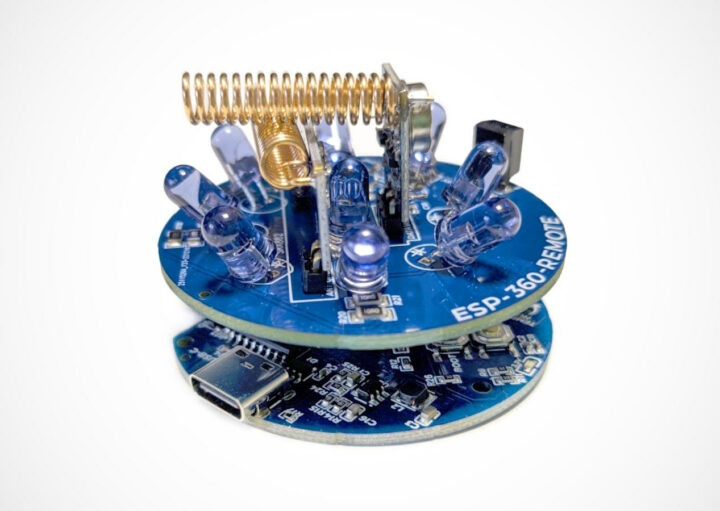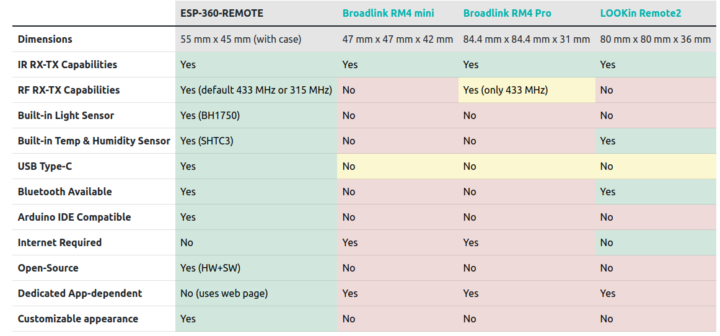ESP 360 Remote is an ESP32-based IR and 433 MHz RF remote with built-in sensors used to control home appliances over WiFi and that also integrates with Home Assistant open-source home automation framework.
The open-source hardware design is comprised of a mainboard with an ESP32-WROOM-32E module, temperature, humidity, and light sensors, and a board on the top with nine infrared LEDs, one IR receiver, as well as a 433 MHz (or 315 MHz) RF receiver and transmitter with the receivers used for learning the code from the remote controls.
ESP 360 Remote specifications:
- Wireless module – ESP32-WROOM-32E with
- ESP32 dual-core microcontroller
- 4MB flash
- 2.4 GHz WiFi and Bluetooth LE connectivity, built-in PCB antenna, fully compatible with ESPHome firmware
- Control interface
- 9x High Power IR LEDs to control devices in all directions (hence the 360 name)
- IR receiver to learn remote control codes
- 433 MHz (or 315 MHz) RF transmitter
- 433 MHz (or 315 MHz) RF receiver
- Sensors
- Ambient Light Sensor (BH1750)
- Temperature & Humidity sensor (SHTC3)
- USB – 1x USB Type-C port for power, data, and programming
- Misc – User LED, programming pins
- Power Supply
- 5V via USB-C port
- Buck converter with higher efficiency than an LDO
- ESD protection
- Dimensions – Board: 5 cm (diameter) x 3.5 cm (height); Enclosure: 5.5 x 4.5 cm
- OSHWA certification – IT000012
The ESP 360 Remote can be programmed with the Arduino IDE, but you can also install ESPHome firmware on the device, and the project is open-source hardware, even certified by the OSHW Association, with EasyEDA hardware design files, 3D files for the enclosure, and ESPHome YAML configuration available on GitHub.
This type of hardware has been available for a while with products such as the Broadlink RM Mini 3, but the problem is that commercial products usually require an Internet connection to connect to their cloud services, and if you prefer having a more secure home automation installation that works in your local network, you’d have to hack the device with third-party firmware, while The ESP 360 Remote works directly with open-source firmware and frameworks like ESPHome and Home Assistant.
As shown in the comparison table above, the LOOKin Remote2 also allows local control without an Internet connection and offers Home Assistant compatibility, but it lacks 433 MHz RF support and a light sensor.
The ESP 360 Remote is now offered on Crowd Supply crowdfunding platform for $69 without enclosure. Shipping is free to the US but adds $18 to the rest of the world, and deliveries are scheduled to start around mid-August 2023. It happens to be the same price as the LOOKin Remote2, but the Broadlink RM4 Pro is quite cheaper at $44.99 on Amazon, while the RM4 mini without RF433 goes for $25.99 on the same page.

Jean-Luc started CNX Software in 2010 as a part-time endeavor, before quitting his job as a software engineering manager, and starting to write daily news, and reviews full time later in 2011.
Support CNX Software! Donate via cryptocurrencies, become a Patron on Patreon, or purchase goods on Amazon or Aliexpress







